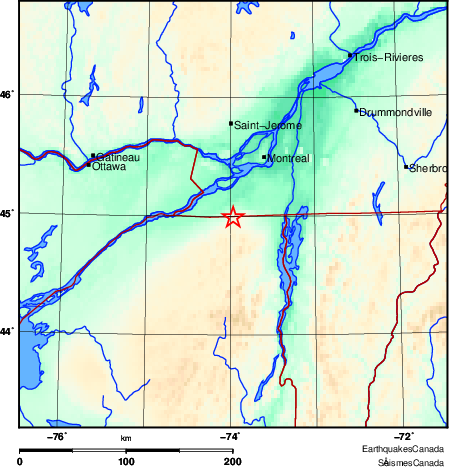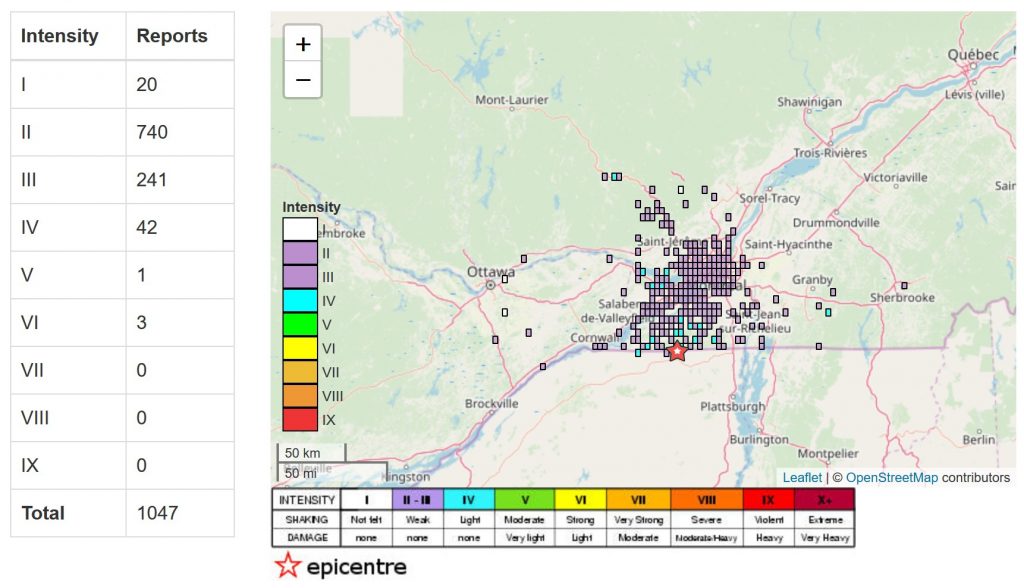Did the earthquake wake you up?
A rare M4.0 quake hit just south of Montreal, Canada.

A very rare earthquake hit 63 km (39 miles) SW of Montreal, Quebec at 5:37 a.m. local time on January 13, 2020. It was notable felt in Rigaud, Saint-Bruno-de-Montarville, Vaudreuil and Montreal, but no damage or injuries were reported.
For perspective… that 3.4-magnitude #earthquake was sw of Montreal near a town called Ormstown, Quebec. That’s 34 miles away from my hometown. My mom said, “It felt and sounded as if ice was falling off the roof, but it was coming from beneath us. Everything shook beneath us.” pic.twitter.com/BJDdbKNUk3
— Zachery Lashway (@ZachLashway) January 13, 2020
Earthquake Canada had first reported a M4.2 at 5:38 am in the Salaberry-de-Valleyfield region, before downgrading the tremor to a M4.0 29 kilometers southwest of Salaberry-de-Valleyfield.
I lived in Northern California for three years, but this morning is literally the first time in my life I felt an earthquake- in Montreal ? 2020 needs to stop being such a dramatic bitch and trying to do EVERYTHING
— Lulu in Canada (@luluincanada) January 13, 2020
https://t.co/COxtvDcFdQ
Up to now, more than 1000 people reported feeling the quake on Earthquakes Canada.

The epicenter was located 11 kilometers (7 miles) from Chateaugay, N.Y., and 63 km (39 miles) SW of Montreal. The USGS listed the tremor as a M3.3 and was reported more than 450 times on their website. Weird such a big difference (M4.0 and M3.3), no?
Some residents of the Montérégie region called the authorities to report rumbling and vibrating noises.
Why are East Coast earthquakes so widely felt?
The Earth’s crust beneath the Eastern U.S. is older and colder than out West. The fault lines are more healed.
As a result, the East is far less seismically active, but when earthquakes do hit, that hard ground is far more effective and conducting the seismic waves.
In the West, where the earth is newer and more faulted, it’s more like hitting a brick, the waves don’t propagate as far.
New Jersey’s geological survey reports that Eastern earthquakes affect areas 10 times larger than Western ones of the same magnitude, although some geologists estimate that figure may be as great as 100-times.
East Coast earthquakes remain rare, but they shouldn’t come as a surprise. There are fault lines in the East, but they’re no longer being pushed or driven, whereas on the West Coast you’re actually pushing those faults and driving them.
Besides this earthquake only two other tremors hit this area of Canada near Montreal (M1.7, M2.2). So rare in my title isn’t an euphemism. Take care and read more on Strange Sounds on Steve Quayle. [Ecan, USGS, Etrack]












